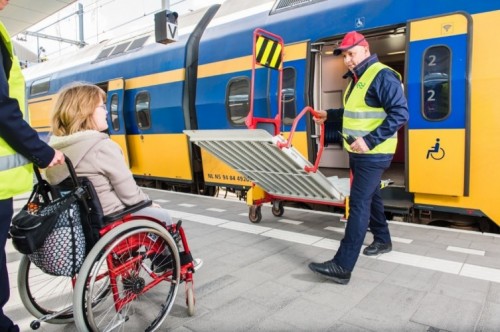
Carla’s travel adventures (part 2)
Written by Huib, published Thursday April 12th, 2018
The article ‘NS and Valys do not meet the requirements for adapted transport for people in wheelchairs‘ was the start of a triptych about adapted transport in the Netherlands. Here you can read the second part, told by Carla. She travels in an electric wheelchair because she lacks an arm and her two lower legs. So she needs assistance from the Dutch Rail ’NS’ and she uses the Valys taxi service. In March, the tender was awarded by the Ministry of Health, Welfare and Sport for an amount of 60 million euros. How well does it all work?
Second train journey in 2018
“I had to get up early, because at 7:17 AM the train would leave. I could not find the elevator to the platform where I had to go. There was no elevator. Fortunately, the assistance provider, who was already standing on the platform, saw me and he knew where to take the elevator. That was at a totally different spot, which was not indicated. The train ride to The Hague Central went well.
Although I actually had to go to The Hague NOI, but during the request for assistance a few days before, the website of NS gave notice that this train station did not exist. Which is strange, because that station has been around since 1843. So I call the NS again: “Yes, sorry, the station does exist, but there is no assistance. So it does not exist “.
At The Hague Central Station I took the tram for the first time. I had read that it was accessible to wheelchairs and fortunately that turned out to be true. (always exciting, when that happens). I arrived at my terminal in good spirit, but when I wanted to take the elevator to get off the cold and lonely platform, it did not work. 2018 is clearly becoming the ‘year of the lift’.
So I call the number of the lift-central. The one I got on the phone ensured me that a mechanic would come somewhere that day, but I was not really helped with that message. So his advice was to take the next tram, change at the next stop, drive back and take the elevator across the station. That meant ten minutes waiting in the cold, on the next tram in the cold and at the next station again 15 minutes.
Then another search for a lift followed and I almost fell out of my wheelchair, because the exit from the pavement was too dangerous. Fortunately, the other lifts did work and I have a catheter, with which I can ‘pee wildly’. It was full due to the extra time. I also did not pay for the extra tram rides that I had to take. So besides ‘urinating’, I also ‘illegally hitched a ride’. I was not even fined.
The return trip that evening went well, even though I had to wait for over an hour at the train station, because you need to request assistance at least an hour in advance. That may also be adjusted, I think. Or would the idea be that wheelchair users or people with other disabilities have plenty of time anyway and can still enjoy themselves wherever they are?
Maybe that is why the spot for disabled people is chosen right next to the smelly toilet, where people also vomit after a night out? I could enjoy that recently. For most people, a toilet is the place where they dispose of their excrements and urine, often leaving the door open afterwards. So it is not the most pleasant place to sit next to. The assistance said that I am not the only one to does not like that much. So I always ask to be able to sit next to the bikes, because a bicycle gets a better service, a nice view from the window and less smell than a wheelchair user.
Yesterday I was parked on such a bicycle spot. There was a woman with a bicycle, who was very insulted that I was sitting there and asked if I could not leave. I had seen that there were other places to park bicycles. In addition, I could not go anywhere without assistance with the ramp bridge.
But misses had to park the bike there. So she put that (% # @ *) thing right against me and went herself in the warm coupe. I told her that I did not find this safe. If a bike falls on me, I have a problem. But that did not matter to her. It would be nice if people realize that. I pay as much as the other passengers, but I have to sit in the hall, where the door always opens. ”
Third train journey
“Traveling by train to a museum in Rijswijk went well. The only bad thing was that I had to wait over an hour in the cold, before the taxi arrived. Because that’s just the rule. I also had to wait an hour for the train (the same rule). I did have a nice young wheelchair taxi driver, who – to my surprise – knew a lot about the limitations that people with disabilities encounter on their travels. “
Fourth train journey
“I had agreed with a friend to go to a museum in Haarlem. Because there are two museums close together, we could maybe go to both. Good fun!
I went to Amsterdam Sloterdijk station with my Canta, while my friend was coming from Central Station to Sloterdijk. Then we would drive to Haarlem together with the train.
The reservation for assistance I had done a few days in advance. When I arrived at the station and stood in line to sign in, two assistance providers came to me excitedly. I already know one of them, so she knew that I was the one they had to assist. “The elevator is broken!“, shouted not two, but three people. Because in the meantime it was my turn at the counter and the lady behind the counter was shouting in chorus. This is already another umpteenth lift this year.
They had fortunately already ordered a wheelchair taxi for me. I indicated that I would travel with a friend and luckily she was allowed. The taxi, however, could only be there in about an hour. We had enough to chat, so the hour passed quickly.
The taxi driver was unfortunately a grumpy elderly man, who immediately told my friend that he had only one person on his form. In the end she was allowed to join. He did not fix my wheelchair properly, either, because he forget to connect one tire to the floor. Because he was so grumpy, I did not want to say anything about it. We were not yet gone or my wheelchair tilted backwards.
It gave me a right scare, but fortunately I could grab hold of something with my good arm just in time and move my weight forward. I called for him to stop and secure my wheelchair. His reaction was “No, you can not tilt backwards“. My counter reaction was “Yes, I can and that just happened.” Fortunately he stopped and secured – now even more grumpy – my wheelchair well.
For the return journey I have been called five times by NS assistance with again and again the announcement that I had to take a few trains later or yet a train earlier, no again later. Because in the meantime it was rush hour and the other travelers get priority.
Also such a nice rule: able-bodied passengers have priority when it’s busy. Fortunately, the museum was worth it, after we finally found the entrance without stairs. Visiting the second museum, of course, was no longer possible.
Carla’s next adventure will be posted on this blog in a few days. Could you help to get her story read by the #NS and #Valys, or possibly also the national equivalents in your own country, by sharing the article on Social Media and tagging both companies?
Huib Kraaijeveld, MA
Author of ‘Shifting the Lyme Paradigm‘, chairman of the On Lyme Foundation and founding member of the Ad Hoc Committee for Health Equity in ICD11 Borelliose Codes

"This book perfectly describes the plight of millions of patients, who suffer from chronic Lyme Disease in many countries all over the world."
Prof. Christian Perronne, France
"This book is a gift of truth and passion to humanity."
Mia Morales, Lyme patient, USA
"I received the book exactly on the day that I had decided to end my life. Huh?! Yep. I am 35 years old years and have been ill for 19 years. Now I know why: Lyme. Everyone should read this book!"
Miranda, the Netherlands
"This book offers a new practical, human centered way of dealing with health information. It is also ringing a bell for the new time how to work together towards health and thriving."
Kim Schimmler, MD, Germany
"This pioneer's work made it perfectly clear that, when "i" becomes "we", even illness becomes wellness."
Frans Vermeulen, journalist, the Netherlands
"In his crucial work on Lyme disease, dedicated social researcher Huib Kraaijeveld does not pretend to have all the answers, but guides us towards asking the upsetting and essential questions."
Prof. Cees Hamelink, professor Communication Sciences & Human Rights, the Netherlands
"This book reads like a thriller! It touched me deeply and I am sure it will change the course of history."
Linda Graanoogst, journalist, the Netherlands
"Well, I am wiping my eyes and blowing my nose, while tears stream down my face. I guess that is a good sign. You hit the nail on the head claiming that Lyme survivors need 'understanding'. I would like my own partner to read this book."
Anodea Judith, PhD & author, USA
"What an awakening perspective! Huib has successfully set a quantum leap for understanding and managing Lyme disease by common people."
John Wong, bestselling author, Singapore
"A true and unpretentious caretakers' guide to understand Lyme. This book will help you to completely understand what your friend is going through; regardless of the symptoms they have. I wish it had been written ten years ago, because it can actually save lives!"
Cheryl Versalle, Lyme patient, USA
"This book actually speaks to people beyond its target audience (caretakers of people with Lyme Disease): people like me who are not travel companions, but to whom it is not hard at all to have or develop understanding and compassion. This makes the reach of this book bigger, much bigger if you’d ask me. I am amazed a book can do all of this!"
Saskia Steur, business blogger, the Netherlands
"This book reads like an exciting novel, were it not that it concerns a deadly serious issue. It calls to contribute and take care of each other and our world. Read, weep, feel and act!"
Manfred van Doorn, leadership expert, the Netherlands
"A creative and very intelligent vision to dive even deeper into the world of Lyme, to look at yourself, other people, but also the entire world around you."
Friend of someone with Lyme
"The book indicates that Lyme disease can be a sexually transmitted disease. This will cause a tidal wave of awareness all over the world. Like the child in the old fairy tale The Emperor’s New Clothes, who exclaimed: 'But the emperor is wearing no clothes!'"
Ola Aniel Petterson, STD campaign leader, Sweden
"What a brilliant sociological work! I am sure it will have much impact."
Professor Neuropathy, Germany
"This book is a big eye opener. Both for friends of people with Lyme disease as well as for people with Lyme. Or for any other health issues, for that matter."
Martin Möhrke, medical research leader, Europe
"I cannot read any other book for more than two minutes now, in this hell called Lyme. Yet yours I cannot stop reading! I should have put it away hours ago to clean the house. But I simply cannot stop."
Ineke, wife of a husband with Lyme, the Netherlands
"This book is a delight to read. It offers soft candlelight and warm campfire camaraderie on an often dark and lonely journey."
Laura Bruno, medical intuitive Lyme expert, USA
"A very honest and yet witty way of helping those with Lyme disease. This book is full of ideas on how to help your friend with Lyme, as a travel companion on this crazy journey called 'Lyme'."
Lisa Hilton, Lyme advocate, USA
"Both the personal experiences as well as the author’s sharp mind turn this into an incredibly inspiring book that raises the consciousness of its readers."
Kara, ex Crohn disease patient, the Netherlands
"Tempting, informative and eminently readable! Shifting the Lyme Paradigm is an absolute eye-opener for those who are not aware of what the journey of Lyme disease entails."
Terri Mackinnon-Cross, CEO WorldLymeDay.com, Canada
"This book gave us the recognition and acknowledgment, which were like a band-aid on an open wound."
Sara, Lyme patient, Belgium
"Very insistently written based on intensive, almost existential, personal experiences, this book also gives a clear overview of all relevant information for both patients and caretakers."
Jan Eendebak, former chairman Lyme Foundation STZ, the Netherlands
"A relief to read, written by an expert who shares his dedication to his own path with us, and brilliantly written."
Muna, mother of a daughter with chronic Lyme, the Netherlands
"Playful, frightening, informative and encouraging."
Merel, kinesiologist, the Netherlands
"This book made me realize that there is too little known behind the phenomenon Lyme. In a challenging manner the author provides understanding of Lyme disease and suggestions for tackling this disease. I have 'prescribed' this book to many of my patients and mostly astonishment was soon followed by recognition. An absolute must for anyone with (still) unexplained symptoms or the people close around them."
Duco Kanij, osteopath, the Netherlands
"This book guides you through the labyrinth of Lyme swiftly, while it took us YEARS to even get this far."
Eugenie van der Linden, ex-Lyme patient and therapist, the Netherlands
"This book is an absolute 'must read' for everyone! For patients, for family and friends, and for doctors who can finally learn that Lyme is more than what is written in their textbooks and that they should not be able to dismiss "unexplained" complaints as psychological too quickly!"
Anne Fierlafijn, MD, Belgium
"Shifting the Paradigm of Lyme is not like any other book on Lyme that I have read. It appeals to a higher consciousness, and is analytical in an introspective way that is pleasant to read. This book is a friendly and warm reminder that no Lyme patient is ever alone."
Thomas Grier, biologist, USA
"This book show how caring friends can intervene to provide succor and alliance ‘against the odds’ of a potentially serious and very complex illness that is still poorly understood by mankind."
Kenneth Liegner, MD, USA



